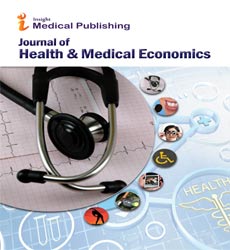The Significance of the Team's Collective Efforts for Patients
Wayne Linder*
Department of Primary Care Health Sciences, University of Oxford, Oxford, Coventry, UK
- *Corresponding Author:
- Wayne Linder
Department of Primary Care Health Sciences, University of Oxford, Oxford, Coventry, UK
E-mail:Jasonc@gmail.com
Received date: August 27, 2022, Manuscript No. IPJHME-22-14776; Editor assigned date: August 29, 2022, PreQC No. IPJHME-22-14776 (PQ); Reviewed date: September 09, 2022, QC No IPJHME-22-14776; Revised date: September 19, 2022, Manuscript No. IPJHME-22-14776 (R); Published date: September 29, 2022, DOI: 10.36648/2471-9927.8.5.77
Citation: Linder W (2022) The Significance of the Team's Collective Efforts for Patients. J Health Med Econ Vol. 8 Iss No.5:77
Description
The on-going problem of drug overdoses in the United States has made it clear that more treatment options are needed right away. The opening and closing of treatment facilities for substance use disorders in New Jersey is looked at in this study to see how it affected nearby residents' trips to the emergency room for substance use disorders. After a facility closes, we find that drug-related ER visits go up by 7.4% and go down by 6.5%.The effects are smaller for middle-aged people than for younger or older people, and they are also slightly larger for Medicaid recipients and Black residents. The findings suggest that drug-related morbidity can be significantly reduced by expanding access to treatment. Medical prevention relies heavily on relaxation methods. As a result, medical students could already benefit from a high level of expertise in these techniques, not only as a personal stress-coping strategy but also for the patient consultation process in the future. With respect to Progressive Relaxation (PR), Autogenic Training (AT), and meditation, depending on social background, the purpose of this study was to compare the knowledge and practical experience of students of economics and medical students.
Treatment Procedures
A research-based bridge-building and treatment project has been initiated by the Danish Multiple Sclerosis Society, a patient organization, and will take place at a specialized MS hospital from 2004 to 2010.The recognition of the fact that people with Multiple Sclerosis (PwMS) and other people with chronic diseases increasingly use both conventional and alternative treatments and that the patient's role is changing and challenging the health care provider's was the motivation for starting the project. Modern PwMS are expanding their knowledge base and moving toward a managerial role in their treatment and self-care choices that improve their MS experience. The PwMS constantly evaluate the treatment procedures and outcomes within the context of their day-to-day lives and demand more comprehensive approaches to treatment and care that take into account their goals and changes in them. When developing patient-centered treatment strategies, the process of building bridges between conventional health care providers and alternative therapists has received little attention in previous research. We developed a tool to facilitate confrontation and make conflicts visible, explicit, and legitimate in order to encourage a constructive dialogue between health care providers and alternative therapists regarding the differences and similarities in their thoughts, actions, and goals regarding the treatment of PwMS. The acronym "Intervention, Mechanism, Context, and Outcomes" (IMCO) is the name of the tool. We'll talk about how to use the tool and the experience and information we gained while building it in the paper. The neurologist, the occupational therapist, the physical therapist, the psychologist, the nurse, the acupuncturist, the nutritional therapist, the classical homeopath, the craniosacral therapist, and the reflexologist will all provide examples from IMCO schemas. A dynamic program theory regarding the significance of the team's collective efforts for patients will be investigated.
Stress Reduction
The delivery of healthcare and health promotion both rely heavily on strategies that support and empower patients to take control of their own care, as well as interventions that increase health literacy. However, the potential contribution of complementary and alternative medicine (CAM) modalities to this endeavor is rarely discussed or investigated. It has been claimed that practicing subjects of Iyengar yoga experience stress reduction and empowerment, as mental distress is a growing public health issue. In a previous pilot study, we were able to demonstrate that intensified Iyengar-yoga group training resulted in rapid stress relief. We wanted to find out how Iyengar yoga helped people feel less stressed in a larger study sample and how much they trained. When compared to the subjects in the moderate yoga group, those in the intensified yoga group showed lower levels of program adherence. When compared to the waiting list controls, both yoga groups demonstrated significant improvements in quality of life, stress, anxiety, depression, rage, and pain-related symptoms. The outcomes were identical for both moderate and intense yoga.
Open Access Journals
- Aquaculture & Veterinary Science
- Chemistry & Chemical Sciences
- Clinical Sciences
- Engineering
- General Science
- Genetics & Molecular Biology
- Health Care & Nursing
- Immunology & Microbiology
- Materials Science
- Mathematics & Physics
- Medical Sciences
- Neurology & Psychiatry
- Oncology & Cancer Science
- Pharmaceutical Sciences
